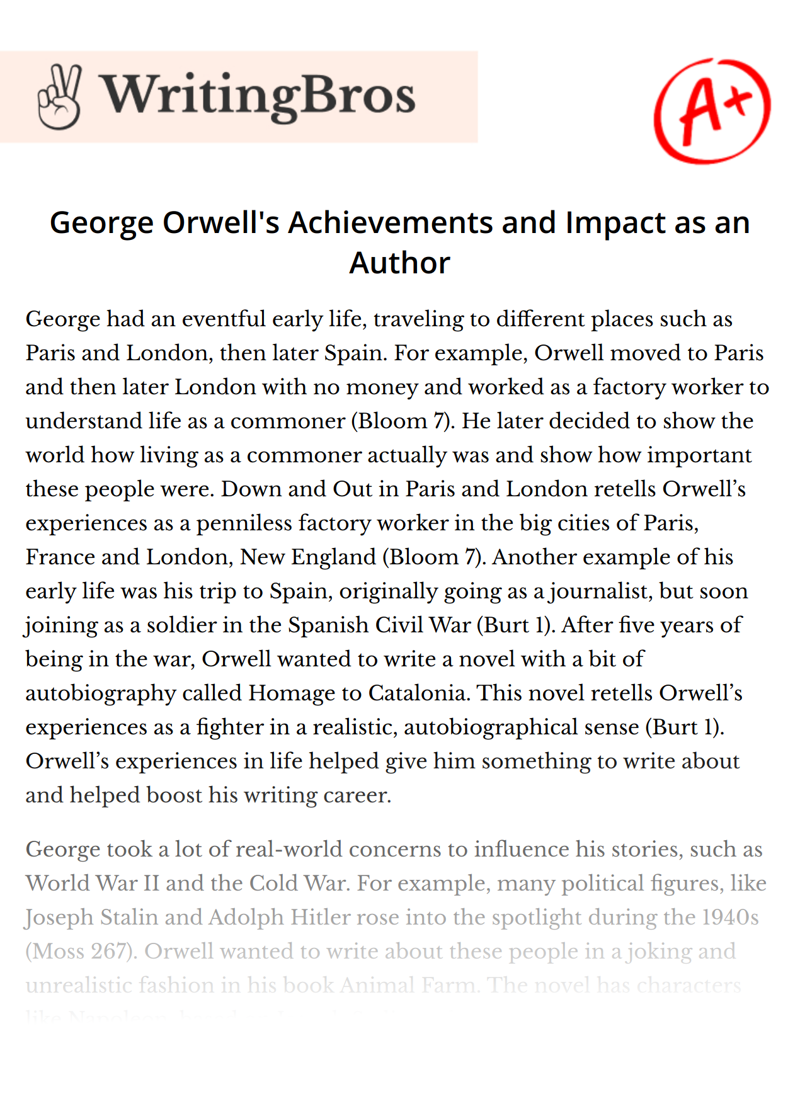George Orwell's Achievements and Impact as an Author

George had an eventful early life, traveling to different places such as Paris and London, then later Spain. For example, Orwell moved to Paris and then later London with no money and worked as a factory worker to understand life as a commoner (Bloom 7). He later decided to show the world how living as a commoner actually was and show how important these people were. Down and Out in Paris and London retells Orwell’s experiences as a penniless factory worker in the big cities of Paris, France and London, New England (Bloom 7). Another example of his early life was his trip to Spain, originally going as a journalist, but soon joining as a soldier in the Spanish Civil War (Burt 1). After five years of being in the war, Orwell wanted to write a novel with a bit of autobiography called Homage to Catalonia. This novel retells Orwell’s experiences as a fighter in a realistic, autobiographical sense (Burt 1). Orwell’s experiences in life helped give him something to write about and helped boost his writing career.
George took a lot of real-world concerns to influence his stories, such as World War II and the Cold War. For example, many political figures, like Joseph Stalin and Adolph Hitler rose into the spotlight during the 1940s (Moss 267). Orwell wanted to write about these people in a joking and unrealistic fashion in his book Animal Farm. The novel has characters like Napoleon, based on Joseph Stalin and makes him head of a political barn known as Animal Farm (Moss 267). Another big issue during the late 1940s was the beginning of the Cold War, causing concerns about nuclear war (Quinn 1). Orwell wanted to write about what would happen if war did break out in his novel 1984. This novel tells about a man named Winston Smith living in a post-war Oceania, under complete control of a corrupt government (Quinn 1). These major wars caused issues for the majority of the world, but in some cases, they helped few people write bestselling novels.
Critics worldwide think of George Orwell’s work as mostly good, some books gaining exceptional praise, such as Animal Farm and Coming Up For Air. For example, Animal Farm was a big hit with the critics because during the 1940s, writing about talking animals was different. Animal Farm is a novel that has characters like Napoleon, based on Joseph Stalin and makes him head of a political barn known as Animal Farm (Moss 267). Most people enjoyed Orwell’s silly, almost kid-like writing and said it suited him better (Bloom 1). Another well-received piece is the novel Coming Up For Air. Orwell’s only first-person novel tells about a salesman living around the time of the start of World War II, trying to return to his childhood village to find peace and sanctum (Quinn 4). Orwell personally hated the book, calling it a failure for it being in the first person, but the majority of readers said otherwise, saying from the first page, the reader is immersed in the character and the situation surrounding him (Quinn 4). Overall, many critics and readers alike love Orwell’s writings, despite Orwell’s hate for most of his initial works.
George Orwell was a very esteemed author, especially after his death, winning the Prometheus Hall of Fame Award for multiple books and even had a period in time that was dedicated towards one of his books, 1984. One of Orwell’s most famous novels is Animal Farm has been a finalist for the Prometheus Hall of Fame Award a multitude of times (Quinn 1). The award is given to exceptional pieces of writing that can influence many people or communities.
Animal Farm was given this award for its public mocking of political movements that claimed to fight for equality (Quinn 1). Another legacy left by Orwell was his book, 1984, that had the world countdown to the year 1984 (Quinn 1). At the beginning of the 1980s, a period in time known as the “Orwell decade” began (Quinn 1). People around the world had celebrations throughout the entire year of 1984 (Quinn 1). George Orwell began to get questioned about how one-sided and half-truthful his books were, but he will no doubt go down in history as one of the greatest writers in history.
Cite this Essay
To export a reference to this article please select a referencing style below

